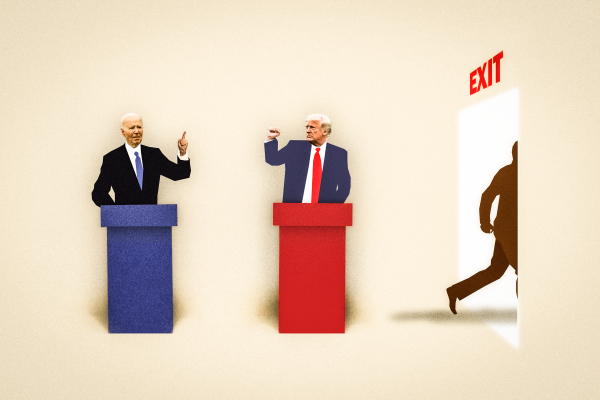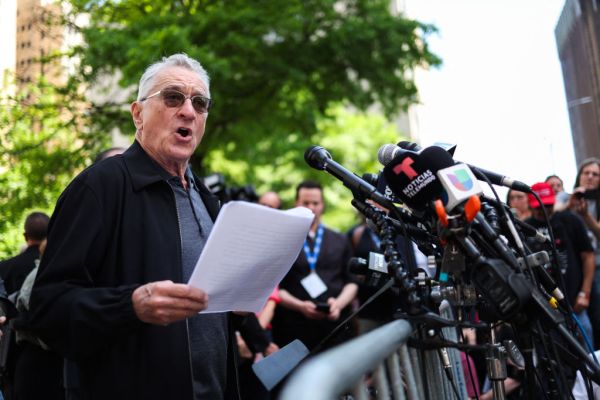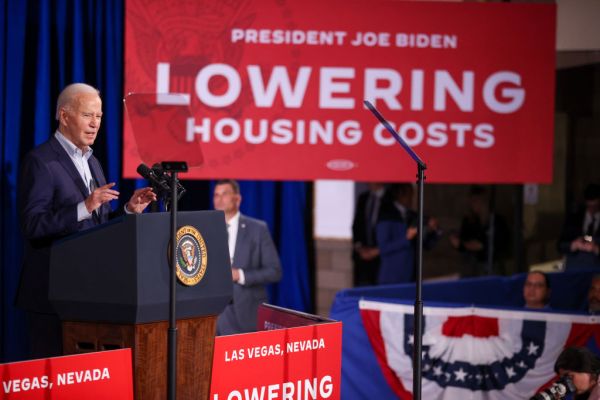When former New Jersey Gov. Chris Christie dropped out of the 2024 GOP presidential race in January, he looked like exactly the kind of Republican the Biden campaign should be courting for an endorsement. “I am going to make sure that in no way do I enable Donald Trump to ever be president of the United States again,” Christie told New Hampshire voters during his withdrawal speech. At the time, he seemed to leave the door open to voting for President Joe Biden.
Similarly, when former Vice President Mike Pence announced on March 15 that he “cannot in good conscience endorse Donald Trump in this campaign,” he also seemed like a prime target for outreach from President Biden and other high-ranking Democrats. A Pence vote for Biden may have been off the table—as Pence himself said in that March 15 interview—but a phone call from the Democratic president could have at least signaled respect to Pence and other disaffected Republicans.
When Nikki Haley dropped out of the GOP primary race in March, Biden did issue a statement: “Donald Trump made it clear he doesn’t want Nikki Haley’s supporters. I want to be clear: There is a place for them in my campaign.” And his campaign later released ads highlighting Trump's insulting rhetoric about Haley.
But Haley never got a call from Biden or his top aides, a senior Haley adviser told The Dispatch (though a group of her former backers now supporting Biden did get a call last week hours after Haley endorsed Trump). Nor did Christie, who by April was telling The View it was unlikely he would back the incumbent president. And Pence told The Dispatch this week that he, too, never heard from Biden or anyone in his campaign since his Ides of March appearance on Fox News. A Biden campaign aide told The Dispatch that outreach to potential Republican endorsers is going on behind the scenes—and those endorsements would be released later in the election cycle to have more impact—but provided no comment on why Christie, Haley, and Pence didn’t get calls from Biden.
The radio silence with the former GOP challengers to his political nemesis is just one signal that Biden and other high-ranking Democrats are more concerned about shoring up support in their own base than they are winning over disaffected Republicans. While Memorial Day is a natural point on the calendar for a general election pivot to the center, the Biden campaign held a press conference on Tuesday outside of Trump’s hush-money trial in Manhattan—the kind of event more appealing to MSNBC viewers than Nikki Haley voters concerned about the rule of law. But perhaps the most significant signal that Democrats intend to run 2024 as a base election is that they’re starting the summer by lurching left on issues ranging from Israel to attacking the Supreme Court.
Pence himself doesn’t begrudge Biden for the lack of outreach, but he is growing increasingly dismayed by what he calls the Democratic Party’s “ongoing capitulation to the American left.”
“Joe Biden won his party's nomination in 2020, but Bernie Sanders won the party,” Pence told The Dispatch, hitting Biden for “runaway spending, an avalanche of regulation … appeasement from day one of the mullahs in Iran, [and] the disastrous withdrawal from Afghanistan.” He was particularly incensed by Biden’s recent decision to halt a shipment of some weapons to Israel: “Seeing the way that the administration has been going back and forth on what should be unambiguous support of Israel in their fight to defend their country against an existential threat of terrorist Hamas … should be deeply concerning to every American who cares about our standing in the world.”
Robert Schwartz, executive director of the nonprofit Haley Voters for Biden that got a call from the Biden campaign last week, said one Haley voter told the president’s campaign: “The Joe Biden that went to Israel after October 7, that's Joe Biden that I would vote for. The Joe Biden that halted shipments to Israel is not a Joe Biden I would vote for.”
The Biden campaign’s call to the group was “a good kind of first step to actually engage Haley voters and listen to them,” Schwartz said, and he expects more. But the view among Haley voters is that “the clock is ticking,” he added. “I think the longer the Biden campaign waits to aggressively court Haley voters, the more people kind of fall back into their partisan camps.”
Softening support for Israel is perhaps the worst foreign policy mistake Democrats could make if they were trying to court unhappy Republicans. Bungling the border would probably be the worst domestic policy mistake. While Biden and Democrats have been touting a bipartisan immigration deal scuttled by Trump and congressional Republicans, Schwartz said there is frustration among Haley voters that Biden hasn’t taken executive action on immigration. “There’s been all these rumors and reporting about an executive order, and I think Haley voters are like, ‘Let’s quit playing political games and actually do whatever you can to fix the border,’” Schwartz said. “If he’s considering an executive order, he should do it.”
Threatening to pack the Supreme Court is yet another item near the top of the list of what not to do to win over disaffected Republicans. Yet for the past two weeks congressional Democrats have been raising the specter of court-packing and other changes intended to undermine the current Supreme Court makeup.
In the wake of a New York Times story that Justice Samuel Alito’s wife flew an upside-down American flag outside her home days before Biden was inaugurated in 2020, Massachusetts Sen. Ed Markey wrote on May 23: “Justice Alito must recuse himself from anything related to the January 6th insurrection and we must expand the Court to ensure that Donald Trump’s stolen seats don’t dismantle our democracy.” While few congressional Democrats have co-sponsored Markey’s bill to pack the Supreme Court, most congressional Democrats haven’t taken it off the table. “If and when we win back the House and the Senate and the White House we will look at the Supreme Court and figure out what can be done about that extremely corrupted and contaminated body,” Democratic Rep. Jamie Raskin of Maryland told Slate. “Yes we will, brother,” Democratic Sen. Sheldon Whitehouse of Rhode Island wrote in response to Raskin’s comments.
Biden hasn’t weighed in on the Alito controversy and hasn’t endorsed court packing, but the growing attacks on the court from Democrats in Congress could scare off potential Biden-backing Republicans worried about a Democratic trifecta. Court packing “would be a total non-starter and would certainly alienate most Haley voters,” Schwartz told The Dispatch.
Pence called court packing “nothing other than a Democrat power grab—an attempt to compromise the independence of the judicial branch in this country.” He was no less strident in his criticism of Democrats’ criticism of Alito.
“These attacks on Justice Alito should be deeply offensive to any American who believes in the separation of powers under the Constitution of the United States,” Pence said. “All of this is motivated clearly by the fact that the American left and many of their acolytes in the mainstream press will never forgive Justice Alito for writing the majority opinion that sent Roe v. Wade to the ash heap of history.”
Despite his dismay over the direction of the Democratic Party, Pence says he has no regrets about his decision not to endorse Trump. “He and I have a continuing and profound difference over the exercise of my duties under the Constitution on January 6, but it’s beyond that,” Pence said. “I have a real concern that the Republican Party and my former running mate are shying away from American leadership on the world stage and are willing to ignore the national debt. And to have a former president relegate this debate over the right to life to the states only is an abdication of leadership.”
As he has done since March 15, Pence declined to tell The Dispatch who he’ll vote for in November. “I’ll cast my vote in a manner consistent with my conscience,” he said. He cares less about trying to affect the outcome of the election than speaking out about issues, without regard for which candidate that helps or hurts. “The calling of my life right now is to use whatever platform I have after 20 years of public service to advocate and to champion the conservative agenda and to champion the cause of conservatism within the Republican Party.”
While there’s no chance Biden could win over Pence, there’s still a case for him to appeal to those who respect Pence and voted for Haley in the primary. “The general sentiment I hear from almost every kind of Haley voter that is open to Biden is that they prefer Biden as a decent human being [compared] to Trump. But on policy, there’s a narrative out there that Joe Biden is too far to the left,” Schwartz told The Dispatch. “That prevents them from being able to kind of seal the deal. So what they’re hoping for over the course of the next five months is that Biden will clearly signal his commitment to running and governing as a centrist and as a bipartisan figure.”







Please note that we at The Dispatch hold ourselves, our work, and our commenters to a higher standard than other places on the internet. We welcome comments that foster genuine debate or discussion—including comments critical of us or our work—but responses that include ad hominem attacks on fellow Dispatch members or are intended to stoke fear and anger may be moderated.
With your membership, you only have the ability to comment on The Morning Dispatch articles. Consider upgrading to join the conversation everywhere.